
On the one hand, it is quite rather confusing indeed to deal with the grading system of A-Levels themselves; however, what is important it is crucial to mention that, the ability to understand the grading system is a rather important matter.
The major objective of 21k School is to annul all the risks that are within their operational field of vision and enable the learners to excel in their academic endeavors.
This guide will highlight the following key areas about the A-level grading system: How the system works, why that system is essential, the role of AS Level, and ways to get good grades.
Table of Contents
Brief Overview of A-Levels
A-Levels, Advanced Level, or Cambridge Advanced level are general and subject-based qualifications that are sat for by students in the United Kingdom and other parts of the world after their GSCEs.
They are normally taken for two years and a student is normally supposed to do three to four subjects.
They are essential in admission to a university and employment because the university and employers accredit them internationally due to sets that are integrated and the hard academic tests.
What Are A-Levels?
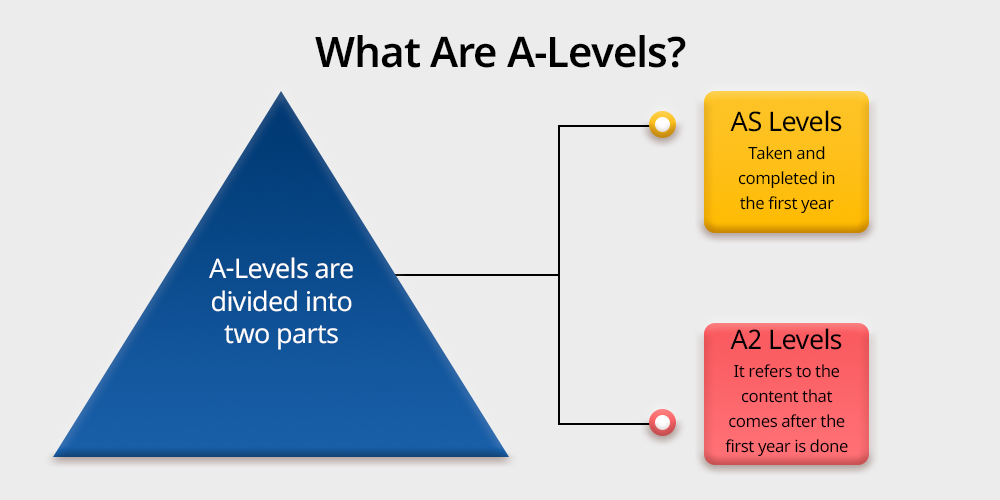
- A-Levels are divided into two parts: A-Levels comprise two sections namely Forms Module
- AS Levels (Advanced Subsidiary Levels): Taken and completed in the first year, the paper comprises half the syllabuses of A-Level courses.
- A2 Levels: It refers to the content that comes after the first year is done and for that reason contains all the material of the year two. Along with AS levels, they make up a full A-level qualification ESOL(English for Speakers of Other Languages).
Importance of Understanding the Grading System
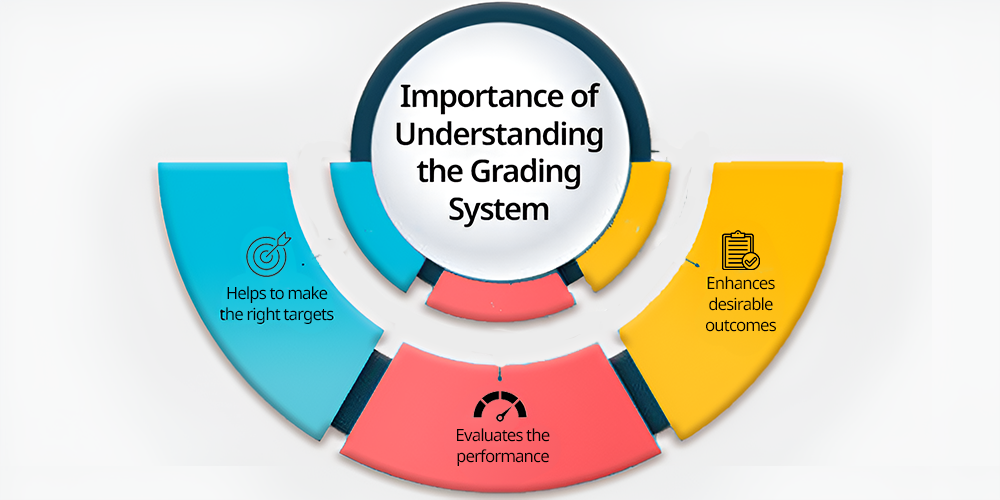
It is, therefore, necessary to have reasonable knowledge of the grading model to make the right targets, evaluate the performance, and enhance desirable outcomes.
Furthermore, it also helps students especially the parent who can monitor the child’s progress, identify areas of poor performance and weakness, choices on further education and career.
Why Do Grades Matter?

They are central to admission into a university, receiving scholarships, and even employment opportunities in the future.
The reasoning behind this is that by getting good grades one gets to secure a place in a good university as well as a better course than getting low grades and being stuck to do a particular course one did not want to do.
How Does Grading Impact Motivation?

A correct understanding of the grading methods can help in improving motivation because it equals personal-oriented objectives.
In this way, the students can be able to focus and help set objectives to produce the best results.
Give a Chart to Explain the A-Level Grading System
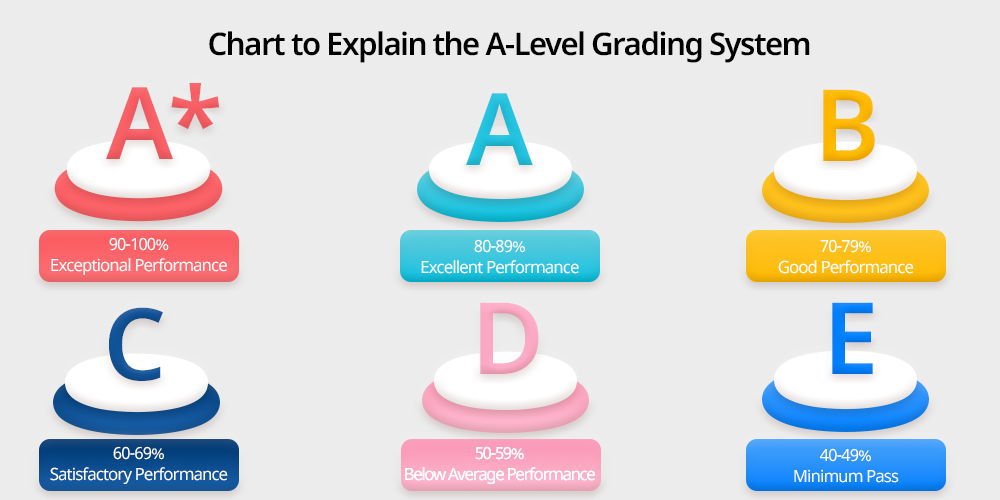
This grading system used for performance in A-Level uses symbols in the form of letters to represent the level of performance obtained. Here is a simplified chart to explain the grading system:
| Grade | Percentage Range | Description |
| A* | 90-100% | Exceptional Performance |
| A | 80-89% | Excellent Performance |
| B | 70-79% | Good Performance |
| C | 60-69% | Satisfactory Performance |
| D | 50-59% | Below Average Performance |
| E | 40-49% | Minimum Pass |
Understanding Each Grade
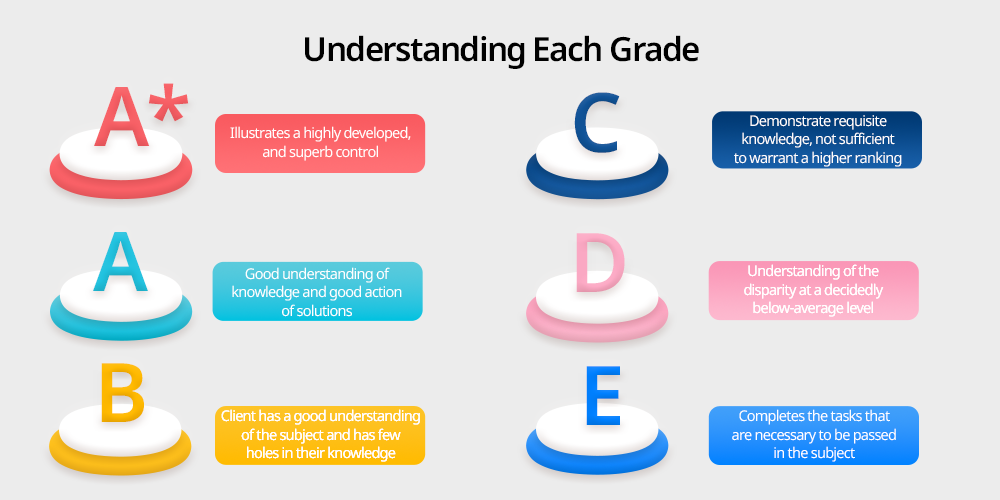
- A* (90-100%): Illustrates a highly developed, and superb control, of the content matter.
- A (80-89%): The test demonstrates a good understanding of knowledge and good action of solutions.
- B (70-79%): Suggests that the client has a good understanding of the subject and has few holes in their knowledge.
- C (60-69%): Demonstrate requisite knowledge which is however not sufficient to warrant a higher ranking in specific areas.
- D (50-59%): It makes the understanding of the disparity at a decidedly below-average level.
- E (40-49%): Completes the tasks that are necessary to be passed in the subject.
The Role of AS Levels in the Grading System
General planning of the A-level frontier grading has been particularly significant with the AS Levels.
These are usually sat after the completion of the first year of the course and such tests normally act as terminal tests that can be combined with the final A-level grade according to the examining body.
What Are AS Levels?
Half of the A-level curriculum has been delivered through AS levels and this is marked through a different exam.
These can be a single qualification as part of an A-level course or part of the full A-level depending on the subject type of the second-year course.
Contribution to Final Grades
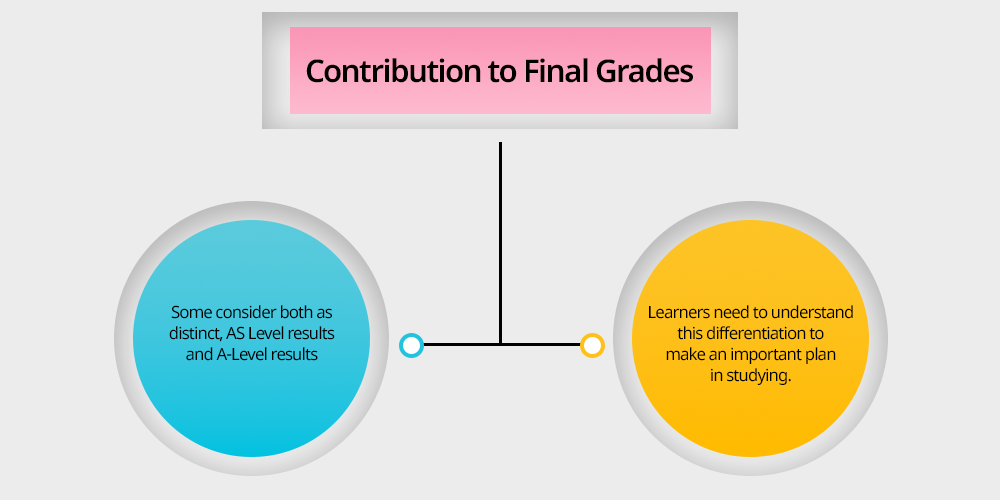
What should be noted is that while most of the exam boards allow the students to transfer the AS Level results towards the A-Level results, some consider both as distinct.
Learners need to understand this differentiation to make an important plan in studying and mounting their application to university.
Advantages of AS Levels
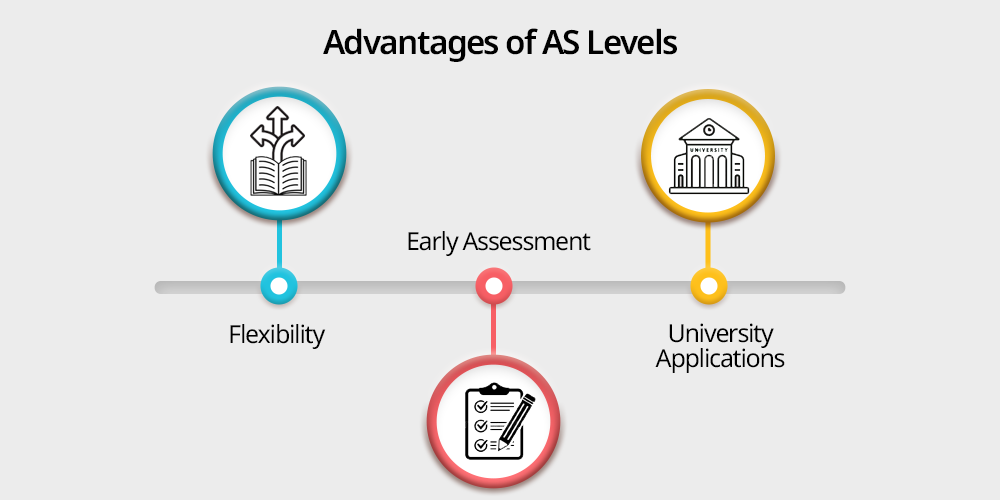
- Flexibility: Students are allowed to withdraw from a subject after AS Levels if, for instance, the course is not suitable for them.
- Early Assessment: Allows knowing how many of the students and to what extent they understand concepts at the start of an A-level course.
- University Applications: Level grades can be included in university applications, providing an early indication of academic ability.
Tips for A-Level Success
To succeed in A-Levels one should commit, to proper study techniques and measurement amid the load of work. Here are some tips to help students excel:
1. Develop a Study Plan

There are a variety of advantages to developing an effective structure for a week’s study schedule: time management and fair distribution of time between all subjects.
Divide the syllabus into several lessons and then plan the days and hours when specific subjects are going to be studied.
2. Utilize Resources

Students should capitalize on resources that are in their textbooks, online tutorials, and past papers.
21K School provides extensive resources for a student to help them excel and understand the given subject area.
3. Practice Past Papers

Reveals students’ exposures with sample papers assist in giving exposure to formats of the examinations and types of questions posed.
It also points out the areas that need attention and at the same time builds confidence.
4. Stay Organized

Maintain order in purchased and collected notes and study.
One should also ensure that the study area is clean and should not have a lot of unnecessary items such as folders, notebooks, writing tools, and a computer or a tablet and this will enable one to revise easily.
5. Seek Help When Needed

No problem should be solved, instead ask the teachers, tutors friends, or other students. Tutorials and study groups add further help and an excellent opportunity to get data from other people’s perspectives.
6. Maintain a Healthy Balance

Make sure that a student plans for books and studies and plans for breaks, exercises, and all the fun-related activities.
The fact cannot be refuted that one’s health, being under control, plays a vast role in a person’s performing abilities.
Conclusion
It is important to of the grading system of the A-Levels for one to have a brief understanding of it.
These perceptions are: Grading criteria, assessment of the use of AS Levels and positive study habits enable the students to achieve their intended consequences.
Welcome to 21K School – You are at the right place to learn all about A-Level as well as get the necessary tools and tips to succeed.
Enjoy the process, do not allow yourself to be diverted, and make it a point to go for quality.



